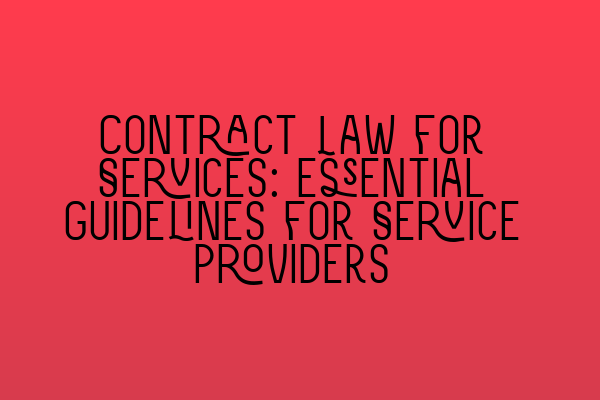Contract Law for Services: Essential Guidelines for Service Providers
In the realm of business, contracts are the backbone of any transaction. They provide a legal framework that helps define the rights and obligations of parties involved. When it comes to providing services, having a well-drafted contract is crucial to ensure a smooth client-provider relationship and protect your business interests. In this article, we will explore the essential guidelines for service providers in contract law and how to navigate through potential legal challenges.
Understanding the Basics: What is a Service Contract?
Before delving into the guidelines, let’s first establish what a service contract is. A service contract is a legally binding agreement between a service provider and a client, where one party agrees to provide a specified service in exchange for a fee or other form of consideration.
Service contracts can cover a wide range of industries and professions, such as graphic design, consulting, IT support, marketing, and more. These contracts are used to outline the scope of work, payment terms, duration, and any other important details that are necessary for the parties to fulfill their obligations.
Guidelines for Drafting a Comprehensive Service Contract:
Clearly Define the Scope of Services:
One of the most critical aspects of a service contract is defining the scope of services. Clearly articulate what services you will provide and what services are out of the scope of the agreement. This can help prevent any misunderstandings or disputes later on.
Interpreting Contractual Clauses: Unlocking the Hidden Meanings
Specify Key Terms and Conditions:
In addition to the scope of services, it is essential to specify key terms and conditions related to the provision of services. This includes details such as the payment terms, deadlines, milestones, deliverables, confidentiality obligations, and any warranties or guarantees offered.
Include a Termination Clause:
A termination clause outlines the conditions under which the contract can be terminated by either party. This clause is important as it provides a way to legally end the agreement if certain conditions are not met or if there is a breach of contract.
Exploring the Impact of Frustration on Contractual Obligations: Legal Insights
Address Liability and Indemnification:
It is crucial to clearly allocate liability and address indemnification in the service contract. This protects both parties from potential legal claims or damages arising from the provision of services. Clearly outline the limits of liability and specify who will be responsible for any third-party claims.
Reviewing and Negotiating Contracts:
While having a well-drafted service contract is essential, it is equally important to review and negotiate contracts before signing them. Here are some key points to consider:
Thoroughly Review the Contract:
Before signing any contract, carefully review all the terms and conditions. Ensure that you understand and agree to all the provisions mentioned. Seek legal advice if necessary to clarify any complex clauses.
Negotiate and Seek Amendments:
If you feel that certain provisions are not favorable or need further clarification, do not hesitate to negotiate with the other party. Contract negotiation allows both parties to reach a mutually beneficial agreement that meets their needs. Be open to discussing amendments and seek legal guidance if required.
Legal Aspects of Business Contracts: Key Considerations for Entrepreneurs
The Importance of Seeking Legal Advice:
Given the complexity of contract law, it is highly recommended to seek legal advice when drafting, reviewing, or negotiating service contracts. A solicitor with expertise in contract law can provide valuable insights and ensure that your contract is legally enforceable and tailored to your specific needs.
SQE Contract Law vs. Traditional Qualifications: A Comparative Analysis
Elevate Your Knowledge with Contract Law Tutorials
To further enhance your understanding of contract law, we invite you to explore our comprehensive range of tutorials. These tutorials cover various aspects of contract law and can help you strengthen your knowledge and skills.
By following these essential guidelines and seeking professional legal advice, you can ensure that your service contracts are robust, enforceable, and protect your business interests. Remember, a well-drafted contract is the foundation of a successful client-provider relationship.
